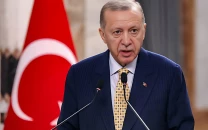UK hints Netanyahu could face arrest over ICC warrant if he visits Britain
PM's spokesman says UK will always comply with its legal obligations as set out by domestic law and international law

The British government indicated on Friday that Israeli Prime Minister Benjamin Netanyahu could be arrested on an International Criminal Court arrest warrant if he travelled to the UK.
The ICC on Thursday issued arrest warrants for Netanyahu and ex-defence minister Yoav Gallant in response to accusations of crimes against humanity and war crimes in Israel’s aggression in Gaza.
Prime Minister Keir Starmer’s spokesman refused to be drawn specifically on whether UK police would detain Netanyahu, telling reporters he would not “get into hypotheticals in relation to individual cases”.
But he added: “The UK will always comply with its legal obligations as set out by domestic law and indeed international law.”
Britain signed the Rome Statute, the international treaty that created the ICC, in 1998 and ratified it three years later.
The UK’s ICC Act 2001 stipulates that when a government minister receives a request from the ICC for the arrest of an indictee they “shall transmit the request and the documents accompanying it” to an appropriate court.
“If the request is accompanied by a warrant of arrest and the appropriate judicial officer is satisfied that the warrant appears to have been issued by the ICC, he shall endorse the warrant for execution in the United Kingdom,” the act adds.
Officials say the act has not yet been used because someone charged by the ICC has never visited Britain.
It is not clear whether the UK court process begins after the ICC issues the arrest or once the indicted person lands on British soil. “We would obviously fulfil our obligations under the act,” added Starmer’s spokesman.




1725099588-0/BeFunky-(41)1725099588-0-208x130.webp)














COMMENTS
Comments are moderated and generally will be posted if they are on-topic and not abusive.
For more information, please see our Comments FAQ